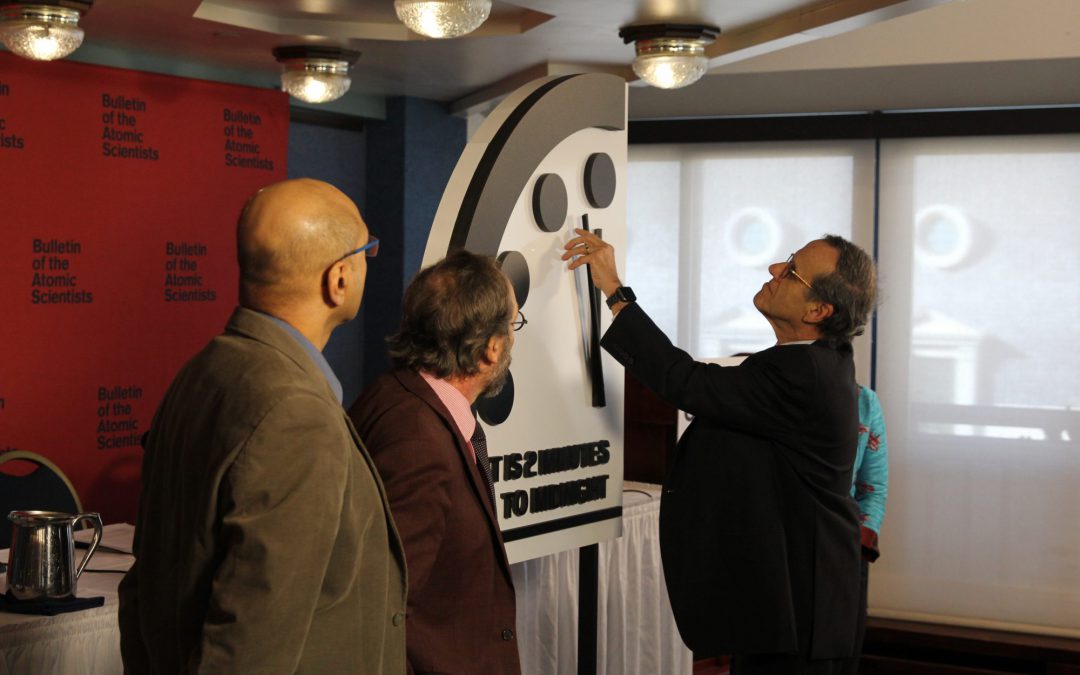WASHINGTON – The world is the closest to significant global catastrophe it’s ever been, the Bulletin of Atomic Scientists announced Thursday as it moved the symbolic “Doomsday Clock” thirty seconds closer to midnight.
The scientists primarily cited nuclear threats and climate change in their decision to move the clock, a symbol the group updates each year, to two minutes before midnight.
In particular, scientists said the lack of global efforts to reduce nuclear arms, coupled with President Trump’s lack of concern over climate change, played a big role in the decision.
“Major nuclear actors are on the cusp of a new arms race,” Bulletin of Atomic Scientists president Rachel Bronson said at a news conference.
“This is not a drill,” said Daryl King, the executive director of the Arms Control Association.
For the Bulletin, midnight symbolizes impending disaster – meaning the closer to midnight, the closer society is to atomic or environmental doomsday. The group has adjusted the Doomsday Clock every year for the past 71 years. The last time the clock was set at two minutes to midnight was in 1953, at the height of Soviet Union hydrogen bomb tests. In 2018, President Trump’s often inflammatory tweets over North Korea, combined with the previous year being named one of the warmest on record, scientists are just as concerned about global safety as they were during the Cold War.
“The United States, Russia, and North Korea have all been escalating rhetoric and technical capabilities,” Alex Wellerstein, an assistant professor of science and technology studies at the Stevens Institute of Technology said in an email. “It is not surprising that the clock moved forward at all – the question was always how much forward.”
In 2017, China and Russia proposed that North Korea freeze its nuclear testing in exchange for the U.S. temporary halting its nuclear exercises as well. However, this proposed deal never materialized, and recent missile tests have shown that the rogue regime has made significant technical advances. So the Bulletin believes that North Korea will soon be able to back up its verbal threats with real weapons. President Trump’s bellicose tweets have also inflamed the crisis, the scientists said.
“The lack of predictability in how the U.S. will use nuclear weapons is embodied in statements and tweets from the President of the United States,” Bronson said at a news conference.
King said in an email that the one bright spot in regards to global nonproliferation has been an October treaty that reinforced the taboo against nuclear weapons possession and use. Known as the “ Treaty on the Prohibition of Nuclear Weapons,” the pact prohibits development and possession of nuclear arms, and has been signed by at least fifty states but not yet ratified. (Neither the United States, Russia nor North Korea had signed).
“Unfortunately, the shift of the Doomsday Clock closer to midnight accurately symbolizes today’s more dangerous nuclear realities,” said King. “It underscores the urgent need for renewed U.S. and global leadership, more active disarmament diplomacy, and citizen action to press their leaders to reduce and eliminate the risk of nuclear war.”
In addition to nuclear weapons, the Bulletin also cited climate change and emerging dangerous technologies as reasons in their decision to move the clock closer to midnight. In particular, President Trump’s decision to pull out of the Paris Climate Accords, increasing natural disasters across the country and the proliferation of fake news have moved the world closer to disaster, the group said.
“The media plays a role in this as well,” Bulletin of Atomic Scientists chairman Lawrence Krauss said at the conference. “It should focus more on significant threats rather than political infighting or salacious scandals.”
While the scientists paint a dim picture of the future, they recommend steps that could turn back the clock. Most importantly, they said the U.S. and North Korean governments should maintain open channels of communication. This, they say, will reduce tension and may get the country closer to negotiating with North Korea to permanently cease further nuclear development.
Many U.S. politicians, including Congressman Adam Smith, the ranking member of the House Armed Services Committee, also advocate for policy changes and continuing dialogue.
“I have been pressing for legislation that would reduce those risks by mandating strategic dialogue with other nuclear powers and making clear that it is not U.S. policy to use nuclear weapons first,” Smith said in an emailed statement regarding the Bulletin’s announcement. “[Nuclear weapons] are a risk we cannot ignore, and it is absolutely essential that we take meaningful steps to improve the situation.”
The scientists said U.S. citizens should continue to demand action on climate change from the government and all countries should increase their efforts to reduce their greenhouse gas emissions. The international community should also establish new protocols to discourage misuse of information, as this affects everyone’s ability to enact meaningful policies in regards to national security.
“The world is in big trouble,” Derek Johnson, executive director of anti-nuclear-weapons advocacy group Global Zero, said in an emailed statement regarding the Clock’s latest tick towards Doomsday. “There are only two ways this story ends: either find the wisdom and courage to urgently reduce and ultimately eliminate these weapons, or the Clock strikes midnight in our lifetimes. We are running out of time to decide which future we live to see.”

